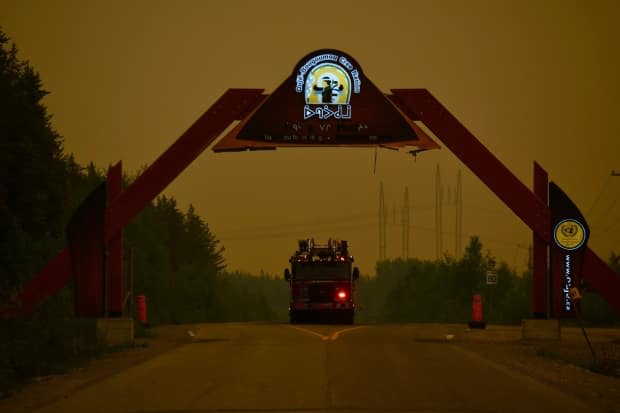Cherished Cree hunting camps vulnerable to the flames of Quebec's raging forest fires

One of the last images Yoanick Dion has of Oujé-Bougoumou is of firefighters digging trenches outside the town as an eerie orange haze filled the air and ash fell from the sky.
On one side of that trench, a line of defence against the blaze, is the Cree community. On the other side is the bush that Dion and so many of his family members and friends cherish.
Dion says he fears for his camp, built in 1988 and handed down by his grandmother through various family members.
The structure in the woods, which he uses as a base to hunt and fish, is now located on the wrong side of the trench — the side where a raging forest fire is consuming the forest.
"We don't know what it's going to be like when we go back," he said, describing how his family had camps near one another outside of Oujé-Bougoumou. "They're all close together. They're probably going to lose their camps too.… We're all going to lose our camps."

As several Cree communities headed south, away from out-of-control forest fires raging throughout northern Quebec, people were lamenting the possible loss of hunting and fishing camps.
The camps' appeal — their remoteness and proximity to the land's traplines — is now what threatens them. They are in areas that are vulnerable to the flames.
Rhonda Oblin-Cooper, the deputy chief of the Cree First Nation of Waswanipi, whose residents left their fire-threatened homes for Quebec City, said Thursday that many members of her community relied on their camps and some stayed there full time, living off the land.
"Their camps in the trapline … That's their main home," she said, her voice breaking from emotion.
On Friday afternoon, Waswanipi announced on Facebook a voluntary return to the community for people in good health.
On Wednesday, Oblin-Cooper said that community members used band radios to communicate the evacuation order to those who live full time in the trapline. They also relied on word-of-mouth and resorted to knocking on people's doors to let people know that the fire was close and it was time to leave.
'The forest, it's our home'
Damian-Ayden Chiskamish-Ottereyes, a lieutenant at the Waswanipi Fire Rescue service, was among the team that went door to door for three hours.
He says he informed residents of the cabins that the fire was heading toward the highway that leads out of town and encouraged them to leave as quickly as possible.
"They kind of panicked and they packed right away and left," said Chiskamish-Ottereyes. But, he said, some people chose to stay.

He says the cabins hold a cultural importance to many in the Cree community.
"It's important to us because we go out to feel free and get away," said Chiskamish-Ottereyes.
"It's where we all go to enjoy ourselves, hunting and learning our culture."
Thomas Stevens, who works for the regional Cree Trappers Association, says some cabins have burned down in Mistissini.
He lives in Waskaganish and says there are over 900 hunting camps across the territory of the Cree Nation. He says losing cabins and personal belongings is a major blow to communities and some people's livelihoods.
"It will have a lot of impact because a lot of these camps — a lot of these families — they stay there most of the year. They'll stay there 300 days of the year. They call this home," said Stevens.
He added that there is also the practical concern about rebuilding a camp, because that can take a long time, given the limited road access.
Allan Saganash works on forest issues for Waswanipi and says he too is saddened by the situation.
"There's a great loss. When you think about the traditional way of living, or, the Cree way of life," said Saganash.
"I'm saddened by the destruction because we are so connected to the forest, it's our home."
'A lot of animals are going to be killed'
As for Dion, he is as worried about the wildlife that makes his camp so special and worries that many animals will not be able to escape the inferno.
"A lot of animals are going to be killed," he said.
Researchers at the University of Sydney estimated that 480 million animals died during Australia's 2020 bushfires, not including insects, bats, or frogs.
In the long term, forest fires can have a positive impact on ecosystems. They release nutrients stored in litter on the forest floor, open the canopy to sunlight and allow some tree species to spread their seeds, according to a publication from the Canadian government.
But in the short term, they wreak havoc. Dion isn't sure what the forest near Oujé-Bougoumou will look like when he returns.
The Quebec government has made it clear that its priorities in firefighting have been saving people, homes, critical infrastructure and facilities which could release toxins if they burn. Cottages and camps may have to be sacrificed, the public security minister indicated.
"I know that in the region [where the fires are] that's the cost," François Bonnardel told journalists Thursday. "Unfortunately, those who have their hunting camps, fishing camps or otherwise, for sure also logging equipment, we don't yet know the extent of the losses."


